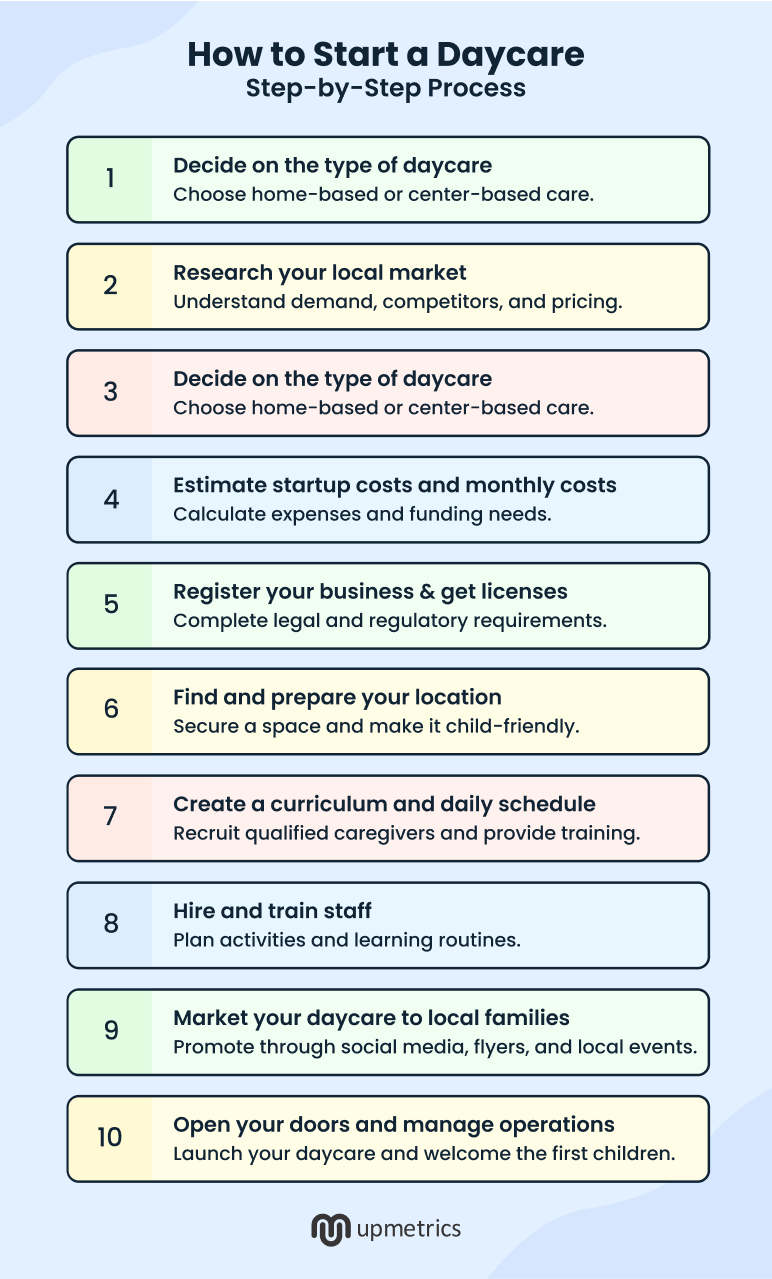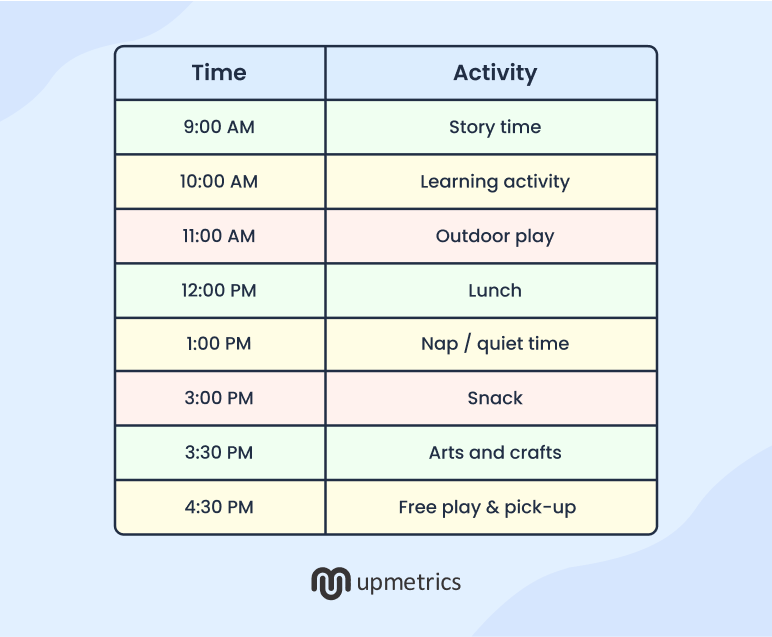Let’s get it out at once: No. Daycare is not just about loving children.
That part matters, of course—but what really defines your daycare success or burnout is: Regulations, money, and your ability to run it like a business.
One: Regulations. Every state has its own childcare licensing requirements, and they’re detailed. Think staff-to-child ratios, square footage per child, background checks, safety standards, even zoning laws. Not something you can “figure out later”.
Two: Money. Startup costs add up quickly—rent, renovations, insurance, supplies, payroll. In fact, the kids’ enrollment usually grows slower than you’d like, so you’ll need enough capital to cover the early months.
Finally: The balancing act. Running a daycare isn’t just providing care; it’s handling compliance, payroll, and marketing, while still creating a safe, nurturing space parents can trust.
In this guide, I’ll break down how to start a daycare business step by step, and share the common pitfalls I’ve seen first-time owners run into—so you don’t have to learn the hard way.
Key Takeaways
- A home daycare may cost $10k–$30k to start, and a small center may cost $50k–$100k.
- You must have licenses, safety checks, and insurance to run legally and safely.
- Hire staff who are caring and trained so parents feel comfortable.
- Keep your daycare clean, follow a clear routine, and talk with parents often.
How much does it cost to start a daycare?
Starting a daycare usually costs $10,000–$30,000 for a home daycare and $50,000–$100,000 for a small center. Costs depend on one-time expenses like licenses, renovations, furniture, and deposits, as well as ongoing monthly costs like rent, insurance, food, and supplies. The total also varies based on size, staff, and location.
We’ll go over daycare startup costs in detail in a section ahead, so you can plan your budget and make smart decisions before opening.
How to start a daycare: Step-by-step process
You can start a daycare without stress if you follow small steps—decide the type, check demand, plan your budget, and set up safely.

Step 1: Decide on the type of daycare (home-based vs. center-based)
The first big choice is figuring out whether you want to start a home daycare or a center daycare. I’ve seen both work well—it really just depends on what you want, your budget, and how big you plan to grow.
Home-based daycare
This is the lower-cost option since you run it from your own home. You don’t need to rent or buy a building, and it’s usually quicker to set up.
Licensing rules are often easier, too. The limit is that most states only let you care for a small number of kids at home, so income potential is smaller.
Center-based daycare
This runs from a separate space, like a rented building. Parents often see centers as more professional, which helps attract families. You can also care for more kids, which means more income.
But it does cost more to start. You’ll need to pay rent, follow stricter rules, and hire staff.
My take: If you want to start small and save money, a home daycare may be best. If you want to grow and serve more families, a center daycare is the right choice—but it takes more money and planning.
Step 2: Research your local market
Before you start your daycare, check if families in your area really need it. I’ve found that doing a bit of market research helps a lot—it shows you what parents want, how much they can pay, and what other daycares already offer.
Start with demand. Look around your community and ask yourself:
- How many families nearby need childcare?
- What ages are most in need (babies, toddlers, or preschoolers)?
- Do parents want full-time, part-time, or after-school care?
The daycare industry itself is also growing. In 2024, it was valued at $298.22 billion and is expected to reach $371.95 billion by 2032. To me, that’s a clear sign that more parents will need daycare in the future.
Now, take a look at your competition. I always suggest researching nearby daycares to see:
- How many children do they care for
- What services and activities do they offer
- How much do they charge
- If they are full, have waiting lists, or lots of open spaces
Next, check pricing. Parents often compare different options. Look at the average rates in your area. Some centers also charge extra for food or longer hours. Ensure your prices cover costs but remain close to what parents expect.
Finally, look for gaps. Maybe local daycares don’t take infants, or maybe they close too early for working parents. If you can fill a gap, your daycare will stand out.
From my experience, doing this research upfront makes your planning so much easier. It ensures your daycare actually matches what families in your area need.
Step 3: Write a daycare business plan
After researching the market, it’s time to write your business plan. I like to think of it as more than just paperwork—it’s proof that you’re prepared and serious about running a daycare.
Many states may ask for it during the licensing process. I’ve also seen banks, grant programs, and investors request it before offering funding. Even parents sometimes feel more confident knowing their daycare is well planned.
Your plan should explain what your daycare will offer and how it will run. Make sure it covers:
- Services – Will you offer full-time care, part-time care, or after-school care?
- Staffing – How many people will you hire? What training or background will they need?
- Pricing – How much will you charge per child? How does it compare with other local daycares?
- Operations – What will a normal day look like? How will you handle safety and routines?
- Marketing – How will you tell parents about your daycare and build trust?
- Finance – How much money do you need to start? What will your costs and income look like?
I see a daycare business plan as your roadmap. It helps you meet state licensing rules, improves your chances of getting funding, and shows parents and partners that your daycare is built to succeed. From my point of view, taking the time to write it carefully now saves problems later and makes it much easier to grow.
Not very good at writing? Need help with your plan?
Write your business plan 10X faster with Upmetrics AI
Plans starting from $14/month

Step 4: Estimate startup costs and monthly costs
Now it’s time to get clear about the money side of your daycare. I always suggest breaking costs into one-time startup costs and ongoing monthly costs—that way, you know what it really takes to open and keep things running.
Here’s a simple breakdown:
| One-Time Costs | Ongoing Costs |
|---|---|
| Licenses | Staff salaries |
| Deposits | Rent |
| Renovations | Food |
| Furniture | Insurance |
| Learning materials | Supplies |
| Technology and website | Marketing and advertising |
👉 One-time estimate: $50,000–$100,000 for a small center or $10,000–$30,000 for a home daycare.
👉 Ongoing estimate: $15,000–$25,000 per month for a small center.
One mistake I’ve seen people make is focusing only on setup and forgetting about monthly expenses. To stay safe, I’d recommend planning for at least 6–12 months of operating costs in advance. This “runway” gives you breathing room if enrollment starts slow.
For funding, you can consider options like:
- Small business loans – From banks or the SBA
- Grants – State or federal childcare support programs
- Personal savings or family support – A common way many start
In my experience, knowing your costs and securing funding early gives you a solid base and makes it much easier for your daycare to grow.
Step 5: Register your business & get licenses
In childcare, following the rules isn’t optional—it’s essential. Skipping this step can quickly cost you trust and, in the worst case, even get your daycare shut down.
I’ve noticed that parents feel more at ease when they know a daycare is fully licensed and inspected.
Before applying for licenses, you should make your daycare a legal business. Pick a structure (like sole owner, partnership, or LLC) and register your daycare name. This lets you open a bank account, sign a lease, and apply for funding if you need it.
Once you’re registered, here’s what you’ll need to secure:
Childcare license
Every state asks for a daycare license. The rules aren’t the same everywhere. They decide how many children you can care for, how much space you need, and what training staff must have.
To get a license, you need to fill out forms, pay fees, and may need to join training.
Business licenses and permits
Many states and cities also ask for a general business license plus local permits for zoning, fire safety, or food service. I always suggest checking with your city or county offices to confirm exactly what applies to you.
Health and safety checks
Before you can open, inspectors will visit your daycare. They’ll check fire safety, cleanliness, exits, play areas, and food handling. It might feel strict, but these checks are important.
They show families that your daycare is safe and well-managed.
Insurance
Insurance protects you if something goes wrong. The main types you’ll need are:
- General liability – Covers accidents or injuries.
- Property insurance – Covers your building, furniture, and supplies.
- Workers’ compensation – Needed if you hire staff.
I know, business licenses & permits, safety checks, and insurance can take time, but they’re worth it. They protect your daycare and show families that you’re legal, safe, and serious about childcare.
Step 6: Find and prepare your location
Your daycare needs the right place to run. This step makes your vision real. The space has to be safe for kids and also meet all the rules. I know parents pay close attention to the look and feel of the space—it often shapes their first impression more than anything you say.
When picking a place, think about:
- Safety: The space should be clean, secure, and child-friendly.
- Space per child: Most states have clear rules on how many square feet you must provide for each child, indoors and outdoors.
- Easy access: Parents need safe and simple drop-off and pick-up areas.
- Zoning: Check local zoning laws to confirm you can legally run a daycare at that location.
Once you find the right spot, prepare it for children. Add child-sized tables and chairs, keep rooms bright and organized, and if possible, create an outdoor play area. Fresh air and active play are things parents really value.
I think of the daycare space as your first marketing tool. Parents decide fast if they feel safe leaving their child with you. A clean, cheerful, and safe space builds trust right away.
Step 7: Hire and train staff
Your team is the face of your daycare. Parents are not only paying for childcare; they’re also trusting your staff with their children. I’ve learned that trust comes less from the building itself and more from having people who are caring, reliable, and well-trained.
Start with the important rules:
- Keep the right staff-to-child ratios so every child gets enough care.
- Do full background checks to make sure staff are safe and trustworthy.
- Ensure staff have the needed certifications, like CPR, first aid, and childcare training.
These steps are not just rules. They’re the base of safety, compliance, and parent trust.
But I’ve noticed parents look for more than just compliance. They want caregivers who are warm, patient, and dependable. Your staff should show the values of your daycare and make families feel welcome and safe.
Training should not stop after hiring. Give your staff regular training in child care, safety, and classroom routines. Training makes staff more confident and shows parents that your daycare takes quality seriously.
Here’s a simple list of daycare staff roles:
| Role | Main Job |
|---|---|
| Director | Runs the daycare, follows rules, talks to parents |
| Lead Teacher | Plans lessons, manages the classroom, helps assistants |
| Assistant Teacher | Helps watch kids and do daily activities |
| Support Staff | Cleans, serves meals, checks safety |
Families may notice your building or program first, but they usually stay because of your staff. A trained and caring team is your daycare’s biggest strength, and the main reason parents will choose and trust you.
Step 8: Create a curriculum and daily schedule
Parents don’t just want childcare. They want a place where their children can learn, play, eat well, and rest in a safe and caring way. Having a daily plan is one of the simplest ways to give parents peace of mind. It shows your daycare is organized and focused on helping kids grow.
A good curriculum should include:
- Learning: Easy lessons like colors, numbers, or story time.
- Play: Indoor and outdoor fun to build skills and friendships.
- Meals and snacks: Healthy food served at set times.
- Naps: Quiet rest time so kids stay happy and refreshed.
Here’s one example of a daily plan:

Parents really appreciate a clear routine. It reassures them that their child’s day has both purpose and balance.
More than that, it proves your daycare values both learning and fun—something every parent is hoping to find.
Step 9: Market your daycare to local families
When it comes to marketing, remember that parents choose care based on trust. Marketing isn’t about big, flashy ads—it’s about showing families that your daycare is safe, caring, and reliable.
According to me, the best ways to spread the word are simple:
- Word-of-mouth: Happy parents will tell friends and family about you.
- Parent testimonials: Ask families to give short reviews you can share.
- Local networking: Go to community events, parent groups, or schools to meet families.
These steps build trust and make your daycare more credible than paid ads.
You should also ensure parents can find you online:
- A simple website with your services, hours, and contact information.
- Social media pages where you can share photos (with parent permission), updates, and news. Here’s an example:

- Add your daycare to Google Maps and local childcare sites so families can find you easily.
In my opinion, good marketing means trust first, promotion second. When parents believe in your staff and your program, they’ll share your daycare with others. This is the strongest kind of advertising you can get.
Step 10: Open your doors and manage operations
Now it’s time to welcome children into your daycare. This is exciting, but I always tell new daycare owners that the real work begins with running the daycare well every single day.
Start with daily routines.
- Is the classroom clean and safe?
- Do staff know what to do?
- Are children getting time for learning, play, meals, and rest?
Talk with parents often.
- Share a quick update when they drop off or pick up
- Send notes or photos during the day
- Make parents feel included and informed
Keep safety first. Check toys, furniture, and play areas every day. Make sure your licenses, permits, and insurance stay current.
Money management matters too. Write down all income and expenses so you know if your daycare is covering costs and making a profit.
Always look for ways to get better. Ask parents for feedback, train your staff, and make small changes when needed.
5 Mistakes to avoid when starting a daycare business
Starting a daycare is a big step, and I’ve seen how the way you begin can make all the difference. Over time, I’ve noticed many new daycare owners fall into the same traps. They seem small at first, but they can slow you down or even hurt your business. Here are five mistakes I recommend avoiding—and what to do instead:
1. Skipping licensing and legal rules
I’ve met people who tried opening without the proper licenses, permits, or safety checks. It always ends badly. Regulators shut you down fast, and parents walk away.
So, ensure you get all required licenses and permits before opening. Check state and local rules, complete safety inspections, and get insurance. Being fully legal builds trust with parents right away.
2. Not planning costs properly
A lot of beginners think only about setup costs—like furniture and renovations. But the real test comes with monthly expenses: salaries, food, rent, and insurance. I’ve seen owners drain their savings because they didn’t plan for both.
So, plan for all one-time and ongoing costs and ensure you have at least 6–12 months of operating expenses covered. Keep track of income and expenses carefully from day one.
3. Not checking local demand
Opening in the wrong spot is risky. If a neighborhood already has plenty of centers, filling spots becomes a struggle. I’ve watched this mistake sink good daycares.
That’s why you should research your area before committing. Look at how many families need childcare, the ages of kids, and existing options. Find gaps you can fill, like infant care or after-school programs, to stand out.
4. Hiring the wrong staff
Your team is the face of your daycare. If they aren’t caring, trained, or reliable, parents will notice immediately. I’ve seen one poor hire undo months of effort.
So, hire carefully. Check references, do background checks, and ensure staff have proper training and certifications. Offer regular training and set clear expectations for behavior, safety, and routines.
5. Using the wrong furniture or equipment
Some new owners buy the cheapest items just to save money. Unsafe or oversized furniture can break or even injure children. Parents notice.
Hence, invest in safe, child-sized, and quality furniture and equipment. Inspect toys and materials regularly. A well-set-up space not only keeps kids safe but also shows parents you take care seriously.
Avoiding these mistakes—and following these fixes—will help you start on the right path and build parent trust from day one.
Final thoughts: Start your daycare with confidence
Starting a daycare may seem big, but with a clear plan, you can do it step by step. From planning money and picking a safe space to hiring good staff and making a daily routine, each step builds trust with parents.
Remember, parents want more than care—they want a place where kids can learn and grow. With focus and steady work, your daycare can become that place. Tools like Upmetrics can help you make a simple plan to guide you.
Good luck as you begin your daycare journey!
The Quickest Way to turn a Business Idea into a Business Plan
Fill-in-the-blanks, AI-assistance, and automatic financials make it easy.


